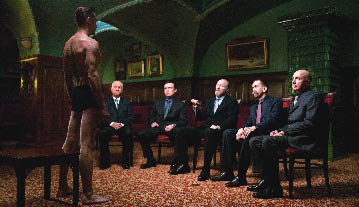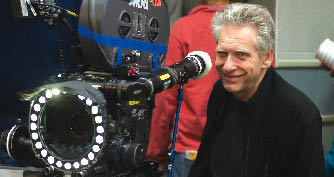The Rough Stuff
by M. Faust

Try to imagine what the result might look like if David Cronenberg had directed Borat, and you’ll have some idea of Eastern Promises.
Okay, okay, I’m kidding. Mostly. Pretty much entirely.
Of course, both movies are about the assimilation, and lack thereof, of Eastern Europeans in the Western world. Written by Steve Knight, whose Dirty Pretty Things was also about London’s immigrant communities, Eastern Promises is a story of the Vory V Zakone, the Russian mafia, as it exists in England. Viggo Mortensen stars as Nikolai Luzhin, chauffeur to the dissolute son of the soft-spoken but merciless mobster Semyon (Armin Mueller-Stahl). Like many who left Russia, Nikolai keeps his own counsel, but also wants to get ahead in this world, whatever it takes.
Counterposed to the brutality of the Vory V Zakone is a family of Russians trying to lead more sedate lives. The family includes Anna (Naomi Watts), a midwife who becomes the temporary guardian of a baby whose severely battered mother died in childbirth. The girl was an enslaved prostitute, as Anna discovers from her diary—a document that Semyon would very much like to retrieve.
My real basis for the Borat comparison, though, is this: At the Toronto Film Festival, where Eastern Promises just had its premiere (it opens in Buffalo theaters this weekend), of all the things there were to say about the film, conversation inevitably centered on a fight scene involving a naked man.
The man is Nikolai, and the scene takes place in a steambath, where he is attacked by a pair of Russian assassins. They are armed with knives, he only with God’s own armor. And let me tell you, if you’ve ever cringed in sympathetic association with a character during a fight, you will cringe here.
At the roundtable interviews I attended for Eastern Promises, this scene was the very first question asked of Cronenberg. With typically dry wit, he proceeded to describe the process of designing a fight scene with more detail than probably anyone could ever want to know. (He did warn us that “This tends to be a long discussion.”)
The salient points:
1. Stunt coordinators like working with actors instead of professional stunt men because they come up with different things.
2. He took into consideration the backgrounds of these Russians—were they in the army, the police, where did they learn how to fight—in choreographing it.
3. Technical details include “where the sound guy will put the mikes—obviously not on Viggo’s clothes.”
But for Cronenberg, whose films almost inevitably involve sundering the human body, the important part of the scene was this: “I’m not going to do impressionistic cutting like the Bourne movies, where you don’t really see anything. I want to see everything, because that’s the point. To me violence is the destruction of a human body. I don’t want to let my audience off the hook. I want them to feel that, and the hard work that’s involved because these bodies want to live.”

When Mortensen, who also starred in Cronenberg’s last film, A History of Violence, later faces the lot of us, you can tell he’s been answering the same question all day. Before he even sits down, he jokes, “No, that wasn’t me in the bathhouse.”
But he affirms the director’s position on the depiction of violence. “I knew that he would be more responsible than pretty much all other directors in terms of the depiction of violence. The reality is that he takes it very seriously, and that’s why he shows it honestly and straightforwardly. He shows you that there’s damage, it’s brutal, and that there are consequences physically and emotionally to any act of violence. A lot of other directors, maybe they’re not conscious of taking it lightly but they are.
“There really isn’t that much violence in History of Violence or Eastern Promises at all, but it stays with you. I know that people will comment on the bathhouse scene, for obvious reasons—it goes on for awhile and there’s nudity, you can’t get away from the brutality of it. But to me, the brothel scene [where Nikolai is forced to “prove his manhood” with a nearly unconscious prostitute] is more disturbing.”
Of course, if one cared to read everything ever written about Cronenberg and pick out the adjective most used to describe his films, “disturbing” would certainly be in the top five. Through the 1970s and ’80s, the Toronto native redefined our notion of what a horror film could be with unsettling movies like Shivers, Rabid and Scanners, culminating in the unforgettable The Fly and Dead Ringers.
Given the amount of destruction rained on human bodies in these films, I facetiously ask him if he feels any responsibility for the current crop of horror movies that linger on torture and pain.
“Absolutely not,” he answers. “I’m guilt free. I haven’t seen Saw or Hostel or any of those. But you can make an interesting case for that being a response to the snuff porn you now find on the internet everywhere, courtesy of Muslim extremists. I know that when I was thinking about [a gang execution scene in Eastern Promises involving a throat cutting], I was thinking about a beheading I saw on the net.
“People ask me, do you think people are desensitized now? I’ve been hearing that for 40 years. In fact I think they’re much more sensitive to violence now than they ever were before because it’s coming close to home. Americans in foreign lands are being beheaded by these guys whose motives we don’t understand. That’s scary to a lot of people. So I think people are more sensitive to violence now in movies, and it has to do with snuff movies—which never existed before. Al Goldstein of Screw magazine offered $50,000 to anyone who could bring him a real snuff film. And nobody ever did—it was an urban legend. But now you’ve got ’em—you can watch them at three o’clock in the morning in the comfort of your own home. This is very spooky.
“And if you ever look at those, they really screw you up. They’re very disturbing, in a way I don’t think any movie is. They’re very provocative, they make you extremely angry and if you’re a certain kind of person probably also extremely afraid. And confused. So I think that —this is me making an apology for movies I haven’t seen, but there might be a connection. Certainly horror always has had that function that you confront the worst fears you have in a controlled way so that you can experience them, there is a cathartic effect involved.”
That would certainly seem to be true in the filmmaker’s case: I’ve met him several times, and Cronenberg is always as relaxed and genial as can be. Told that Naomi Watts claimed to have been a little leery prior to meeting him on the evidence of his work, he laughs and says, “You’d think that an artist herself would know better. But then I remember Marty Scorsese saying he was nervous to meet me, because he’d seen Shivers and Rabid and they terrified him. And I thought, the guy who made Taxi Driver is nervous about meeting me? It’s always, ‘Oh, I’m a nice guy, but you must be a psychotic.’ The relation to an artist is complex. I guess it could be one-to-one, a psychotic who does psychotic work, but usually it’s not that simple. We all know that comedians are the most hideous depressed people, not very funny at all in person.”
Cronenberg’s next project isn’t a film. Like Woody Allen, Werner Herzog, Atom Egoyan, Baz Luhrmann and others, he’s going to try his hand at directing an opera. Adapted from his film The Fly by Howard Shore, who has scored almost all of his films, it’s scheduled to premiere in Paris next year before moving to Los Angeles in September.
“It happens over a much larger time span than a movie—opera singers are booked years in advance. And it’s really a composer’s medium. This is Howard Shore’s show, not mine, as far as I’m concerned. The librettist is David Henry Wong, who did M. Butterfly. And their work is done. So I as a director can only mess it up! I’ve had no experience with it at all. It terrifies me, really, cause I don’t know what I’m doing.”
Something terrifies you?
“Oh trust me, it’s not hard.”
|
Issue Navigation> Issue Index > v6n38: About Face (9/20/07) > The Rough Stuff This Week's Issue • Artvoice Daily • Artvoice TV • Events Calendar • Classifieds |









 Current Issue
Current Issue